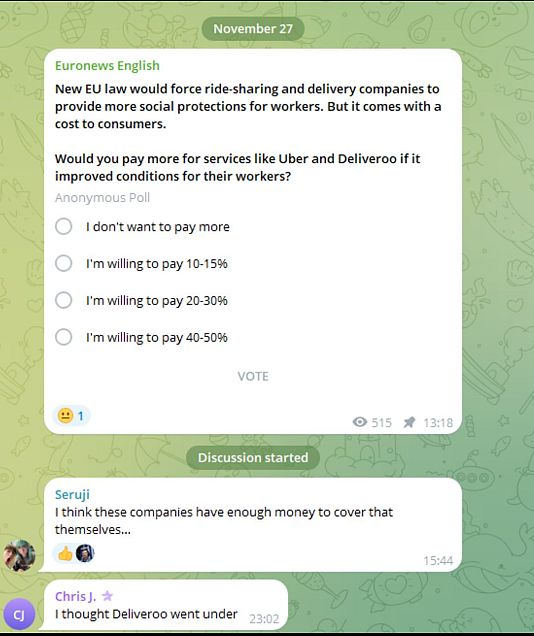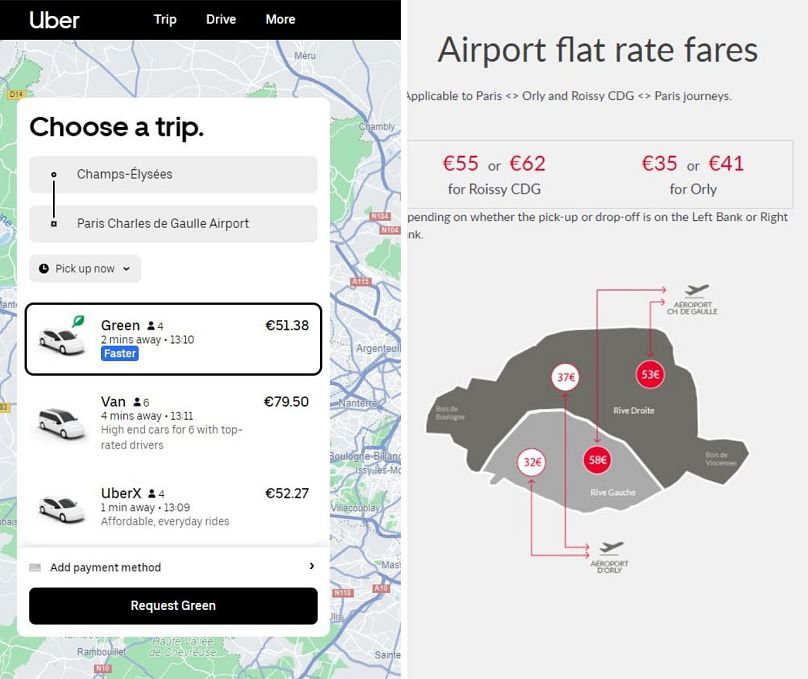Euronews Business' survey sheds light on how Europeans feel after an EU official said citizens would be willing to pay more to improve gig workers' conditions.
Europeans may need to pay higher prices for delivery and ride-hailing services like Uber and Deliveroo once a new EU directive is approved and implemented to ensure improved rights for platform workers.
 ADVERTISEMENT
ADVERTISEMENT
 ADVERTISEMENT
ADVERTISEMENT
A top EU policymaker has recently expressed his view that Europeans are ready to pay more for such services, even though the estimated rise in prices could be as much as 40%.
Nicolas Schmit, the EU’s commissioner for jobs and social rights, made the comments in an interview with the Financial Times (FT) last week about the draft legislation, which, if passed in its current form, would turn gig workers into de facto employees and force ride-sharing and delivery companies to provide them with more social protections.
The interview came after ride-share giant Uber warned that the proposal would force its ride-hailing service to shut down in hundreds of European cities.
"People are ready to bear the cost," Schmit said, according to the FT. "There’s this idea you can correct the low price by a tip. This is not normal. If there’s a cost it has to be paid."
What people really think
Is Schmit right? Are Europeans "ready to bear the cost" and pay more to improve conditions for gig workers?
Euronews Business carried out a survey across various social media platforms, including Instagram and X (formerly known as Twitter), to find out what people really think.
A quick disclaimer: This is not representative market research. We received 1,242 responses from across Europe, without selecting them by gender, age, or location.
Some respondents left comments as well as voting in our survey, the majority of whom said it should be the companies themselves who should bear the costs.
"It shouldn't have to come to a cost for consumers! We're not talking about a small family company. Or a local shop. Same case as Amazon. Just greed..." said a journalism graduate on LinkedIn.
Another person commented on X sharing some ideas on how she would tackle the extra cost: "Reduce CEO pay, collect taxes fairly, and pay fair wages. The cost should be on the corporations."
A third person said: "I want to pay less and (have) improved social conditions for workers and users."
Respondents on Instagram tended to be more generous, with the highest percentage of people (44%) answering that they were prepared to pay 10-15% more for such services if they came with improved conditions for the workers.
On LinkedIn, 45% of those surveyed refused the idea, but some suggested that they'd consider shouldering some of the costs if more details were given.
The overall result is 'yes': Europeans on average would be happy to pay between 10 and 50% more to improve working conditions, most of whom fell within the 10-15% bracket.
Specifically, almost 500 respondents said they were prepared to pay 10-15% more. However, if calculations in Brussels are correct, roughly 40% more would be needed to improve conditions.
EU commissioner Nicolas Schmit commented on Euronews Business' findings by saying, "There needs to be a rebalancing. At the moment the platform worker is bearing the brunt. The survey shows there is a slight majority of customers ready to pay a bit more and certainly the platforms have to pay their part as well."
What exactly needs to be improved for gig workers?
Platform work (work through an online platform) has become increasingly popular over the past few years due to its low entry requirements and flexible hours.
The industry covers taxi drivers, food delivery riders, care workers and more, who use apps to provide their services.
In 2020, more than 28 million people were platform workers, according to the European Commission. This number is expected to swell to 43 million by 2025.
Meanwhile, millions of them perform their job without either the right to a minimum wage, health protection and the right to paid leave, or improved access to social protection against work accidents, unemployment, sickness and old age.
According to the European Commission, 55% of platform workers earn less than the net hourly minimum wage (if it exists in their country) and more than 40% of their working time is unpaid.
They may even face drastically declining income.
French delivery workers reported shrinking wages due to a new method of calculating payments Uber Eats introduced.
In response, French delivery workers held a national strike during the first weekend of December.
Trade union CGT told Euronews Business that the strikes were the biggest in three years.
"It demonstrates the anger of riders that have no other choice than going on strike to win their claims," said Ludovic Rioux, CGT secretary to Euronews Business.
He added that workers' waiting time should be paid and that the platforms themselves should contribute to social contributions.
Rioux branded Uber's claims that it would have to close down across Europe if the EU legislation came into effect as "blackmail".
Are jobs in danger?
The head of Uber’s mobility division in Europe, Anabel Díaz, told the FT that full working rights for drivers would force the company to shut down service in hundreds of cities, raise prices and employ fewer people who would lose the flexibility of platform work, meaning they have to show up for shifts and not work for any other app.
EU commissioner Nicolas Schmit dismissed the approach as "scaremongering," according to the FT, adding that he was confident that "there's a strong market for these kinds of services" and Uber and all the other platforms can adapt their business model.
However, taking a closer look at the prices shows that Uber doesn't have much room for manoeuvre in major capitals such as Paris.
Our simulation shows that there's not much difference between Uber's prices and those of G7, one of Paris' biggest taxi companies, for a ride from the Champs-Élysées to Charles de Gaulle Airport.
The prices can vary according to destination and time, but the current simulation shows that a 40% rise in Uber's prices would cost its competitiveness.
At the moment, when the cost of living crisis is still a very real concern in Europe and the looming threat of an upcoming recession is keeping policymakers and economists on their toes, it may be unrealistic to expect people to pay a lot more for such services.
But years from now, the situation could be completely different.
Even once the draft law is passed in the European Parliament, it will take an additional two years for member states and companies to adjust to the change, and who knows how things may have developed by then.












